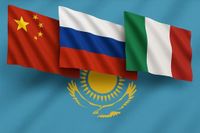Kazakhstan's foreign trade landscape has seen significant developments in 2024, with China, Russia, and Italy emerging as the country's top trading partners, according to a report from the Trade and Integration Ministry's press service on May 6, 2025. This trio accounted for the largest shares of both exports and imports, reflecting Kazakhstan's growing integration into global markets.
In 2024, Kazakhstan's total export revenue exceeded $81 billion, with crude oil constituting a staggering 52.5% of this amount. Specifically, crude oil exports reached $42.9 billion, underscoring the country's reliance on its natural resources. Other notable export goods included uranium, which brought in $4.6 billion, copper and copper cathodes at $4.1 billion, and copper ores and concentrates totaling $3.2 billion. Demand for additional commodities such as ferroalloys, natural gas, wheat, and petroleum products also remained robust throughout the year.
Imports into Kazakhstan also rose significantly, particularly in sectors such as technology, transportation, and pharmaceuticals. The largest categories of imports in 2024 included passenger cars valued at $2.3 billion, aircraft at $1.8 billion, and pharmaceuticals at $1.7 billion. Telecommunications equipment also featured prominently in the import mix, showcasing the country's increasing need for advanced technology.
As 2025 commenced, these trends appeared to be sustainable. In January alone, Kazakhstan's exports reached $4.5 billion, with oil accounting for an impressive 60% of this figure. The leading export items during this month also included copper, ferroalloys, wheat, uranium, natural gas, and sunflower oil. Imports rose to surpass $2.8 billion, with key categories encompassing telephones, car bodies, medicines, and passenger cars. Notably, there was an increase in the supply of construction equipment and engines, indicating a potential boost in domestic infrastructure projects.
In a parallel move towards strengthening its economic ties, Kazakhstan has signed a roadmap for cooperation with the United Kingdom, aimed specifically at enhancing agricultural collaboration. This agreement paves the way for partnerships in agricultural science, the export and processing of agricultural products, and the transfer of British agricultural technologies. The signing took place during the 11th meeting of the Kazakhstan-UK Intergovernmental Commission on Trade and Economic Cooperation in London, which occurred during the week of May 2, 2025.
Deputy Minister of Agriculture Ermek Kenzhekhanuly highlighted the importance of this collaboration, stating that the introduction of British technologies and investments would bolster the competitiveness of Kazakhstan’s agro-industrial sector and enhance its resilience to climate change. In 2024, the agricultural trade between Kazakhstan and the UK totaled $50 million, but officials are optimistic about significantly increasing this figure in the coming years.
Emphasizing the UK's strategic role, Deputy Minister of Foreign Affairs Alibek Kuantyrov noted, "The UK is one of Kazakhstan’s key trading partners and top investors, with total FDI (Foreign Direct Investment) exceeding $22 billion." He further expressed a commitment to building a next-level partnership focused on investment, technology, and knowledge transfer, which aligns with the broader Strategic Partnership and Cooperation Agreement signed between the two nations in 2024.
On the energy front, Kazakhstan continues to produce oil at levels exceeding previously agreed limits. Commerzbank's commodity analyst Carsten Fritsch reported that the Kazakh Energy Ministry anticipates daily production, including condensates, to remain at around 277,000 tons in May 2025, consistent with April's output. This translates to approximately 2 million barrels per day, with crude oil production likely hovering around 1.75 million barrels per day.
Fritsch noted, "The ceiling agreed for May would therefore be exceeded by around 300 thousand barrels per day if the compensatory cuts are not taken into account." This overproduction raises concerns about potential market repercussions, particularly regarding oil prices and the dynamics within OPEC. Analysts suggest that this situation could prompt Saudi Arabia to push for increased oil production in July, further complicating the global oil market landscape.
As Kazakhstan forges ahead with its economic strategies, the interplay between its natural resource exports, technological imports, and international partnerships will be crucial in shaping the nation's future. The ongoing developments in trade agreements, particularly with key partners like the UK, alongside the challenges in oil production, will play a significant role in determining the trajectory of Kazakhstan's economy in the coming years.




